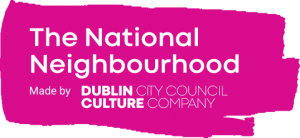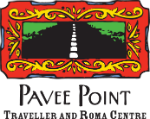The Pavee Roads Home project was an exploration of Traveller culture and heritage told through the lens of history and geography. It was the idea of a group of Traveller men, working with Pavee Point Men’s Health Team, who engaged with a wider network of Travellers from different generations to research and document places, stories, a way of life and the important role Travellers have played in Irish history.
Travellers Gathering and Documenting Information
It’s important we recognize the significance of the information being gathered and documented as we know having a relevant record of information gathered directly from Travellers telling their story is invaluable in sharing this with future generations. Digitising the project into this StoryMap allows the wealth of information and knowledge to be fully documented and accessible to anyone with a keen interest in Traveller culture and heritage.
Important Traveller Memories
The project would not have been possible without the contributions of the many Travellers who gave their time to tell their story and travel down, identify and map exact locations of old campsites they once stopped on that was part of a wider route travelled by theirs and other families. Particularly Bridgie Collins, Biddy Collins, Sheila Reilly, Maggie Mc Donnell, Nancy Collins from the Pavee Point Primary Health Care Team.
This project would not have been possible without all the Travellers involved. The information which forms every part of this project resides solely in the minds and memories of these Travellers.
The project also had a number of collaborators who each brought something different which allowed the project to evolve and flourish due to different experiences and expertise of all those that supported Pavee Roads Home.
Dublin City Culture Company
The value added by all involved can not be underestimated. Brian Fleming from Dublin City Council Culture Company secured funding for the project through The National Neighbourhood, a Dublin City Council Culture Company initiative. However it wasn’t just funding, Brian’s ability to share our belief on focusing on the process and allowing the men to shape the project as it evolved was essential to its success. Here Brian Fleming writes:
“This project with Dublin City Council Culture Company, we always begin with tea and chats and find out what is of interest to a group and build the project with them around that. A recurring theme that comes up in conversations with the men is that there’s a missing link in Traveller identity today, particularly for men, a link with a time when settled people and Travellers traded horses, cars and labour and when Travellers were legally allowed to freely travel the country. With a bit of help from Tony, Seamus and the women in Pavee Point, and through their mapping and genealogy projects, the men are hoping to bridge that gap with their past.”
The Genealogist And The Artist
Brian brought the artist Seamus Nolan and genealogist Tony Hennessy on board to facilitate and support the vision the group had for the project, as well as putting forward ideas and helping the group create opportunities and possibilities that is more achievable when we create the conditions for a genuine transfer of knowledge to take place through group work.
Seamus brought his experience, artistic vision and research skills to the mapping section of the project with Tony Henessy bringing his vast experience as a genealogist who has worked with Travellers previously. Here Seamus Nolan describes his experience of working on the project:
“I have never worked with a group of Traveller men before, never sat at a table and shared my own experiences and ideas in such a space of reciprocation and collective production. During this project however, I did, whether it was discussion taking place in the lecture hall of the National Gallery, in the work spaces of Pavee Point, under the shelter of the trees along the grand canal at Toberdaly, the basement of the tenement museum, the grotto at Avilla park, the seminar rooms of the Geography department in Maynooth or the supermacs booth in Edenderry.”
“In these and the many more spaces of this project questions have been asked and answered, or yet to be answered, plans have been hatched and implemented, relationships formed and cemented, walls climbed, yarns spun, routes circumvented and critiques dispensed. At these sites and stopping places, these specific and incidental activities have been shared with the core group of participants, with an extended group of facilitators, with partners, organizers, photographers, parents, swans, water bottles and tea cups, with children, children’s children, ancestor’s and extended families.”
“There were times when I felt in these spaces, among these people, within these discourses an extreme camaraderie and collective purpose and other times when I felt the volume and chasm of cultural difference. This chasm was greatest in my own resistance, or alienation to the unique processes of knowledge and production of a community so steeped in the richness of family, of language, and of cultural history but equally in the narratives of oppression and discrimination which have become the shared narratives of Traveller communities. And I hope that this project in all its formal and informal facets might foment to some degree the idea of the National Neighborhood as both a concept and as a cultural project which acknowledges the huge and diverse range of participants, practices, and ontologies of which it is formed.”
Family Trees Donated to National Library
The family trees produced were donated to the National Library of Ireland which marks an important addition to the archive because it is material generated by Travellers themselves and gives visibility to the role Travellers have played in Irish society. The Director of The National Library, Dr Sandra Collins, said:
“We are honoured to relieve this donation to the national collections and delighted to have worked with the Pavee Roads Home project and Dublin City Council Culture Company on this initiative. It is important that the national collections include the diversity of Irish experience, and Traveller heritage is a welcome addition to our collections which tell their story of Ireland.”
Maynooth University Geography Department
We also had the opportunity to link in with the MU Geography Department and MA in Spatial Justice whose support and shared belief in the value of strong community partnerships led out by communities allowed us to develop this fantastic resource the Pavee Roads Home Storymap.
We worked with a dedicated and knowledgeable team in Professor Karen Till, Dr Rachel McArdle, Sasha Brown, Professor Gerry Kearns, Dr Conor Cahalane, Dr Dean Phelan, and a group of PhD and MA students who immersed themselves in the project and into the world of the Travellers who told their story through Pavee Roads Home. Karen and Rachel speak about the experience of the Geographers from MU who worked with us:
“This past year, Maynooth University Department of Geography and Pavee Roads Home created a research team to develop the StoryMaps on the pages you see here. Maynooth Geography is committed to ethical and responsible research with the goal of making our world a better place to live in, but we cannot do this without the expertise, generosity and support of community partners. With Pavee Roads Home, we brainstormed, shared knowledges and ethical research practices, and learned new skills together. We created a relationship of trust that Maynooth Geography Team hopes will continue into the following years. The students and staff benefited enormously from working with Andy, Michael, and Martin, as well as with Seamus and Rosaleen, learning the importance of Travellers’ histories and geographies in Ireland, the value of storytelling as a form of communicating life knowledges, and working closely with PRH on a real-life project. All of us also learned the skill of creating StoryMaps. We hope you will enjoy the outcomes of our partnership.
For any further information about the project contact – info@pavee.ie

